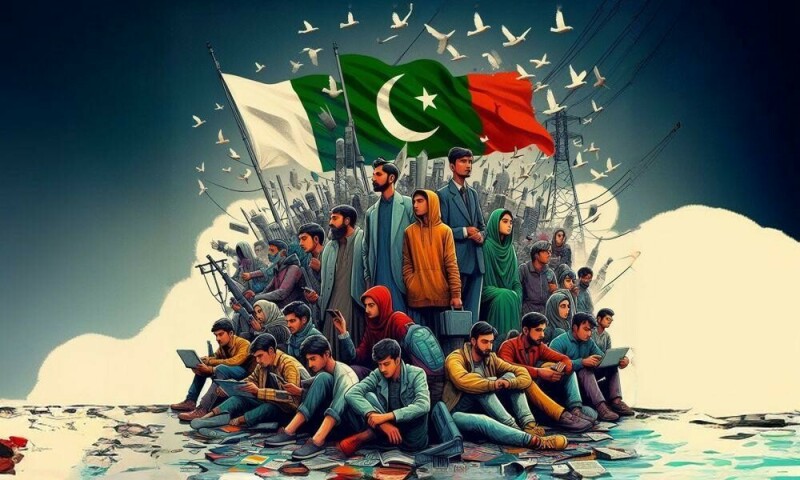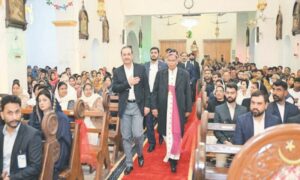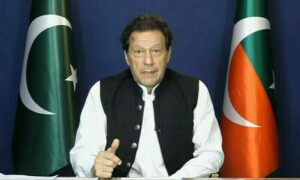With a barrage of challenges awaiting the incoming government, Pakistan’s cyclical dystopia perseveres. Another meaningless election. Another debilitated government. Another divided house. And round and round we go.
“Hope is a good thing, maybe the best of things. And no good thing truly dies.”
— Andy Dufresne, The Shawshank Redemption
For Rehan Shamsi, 61, hope is a double-edged sword. A seasoned participant in Pakistan’s tumultuous political history, Rehan was but a 25-year-old engineering student in Karachi when the death knell sounded on General Ziaul Haq’s decade-long stint at the country’s helm.
Amid cheers of hope and merriment, Benazir Bhutto assumed the reins of power in the winter of 1988 — an event considered to be a critical inflection point in the country’s long, agonising crusade to democracy. It seemed the sun had finally dawned on a people downtrodden by decades of shattered promises and dead aspirations.
“I don’t think today’s generation understands the optimism that permeated the air in ’88. It was a genuine moment of hope. I know it sounds idealistic now, but you have to understand where we were,” reminisced Rehan. An active member of the National Students Federation and a worker of the Qaumi Mahaz-e-Azadi Party in the 80s, he vehemently believed in and campaigned for Benazir’s Movement for the Restoration of Democracy (MRD).
“My parents migrated from our village in Lucknow in 1948 because they believed in the inherent freedoms this country promised. They died waiting for things to change, for the suffering to stop.” he lamented. “During the MRD, some of my friends were publicly flogged. Many were imprisoned. So when we finally won the right to vote, we knew what it meant. For the first time in our lives, it felt like we had a seat at the table. So I know the sanctity of the vote. We sweat and bled for it. All my life, I had waited for it.”
More than three decades later, Rehan is still waiting.
Cyclical dystopias
Today, the country stands at yet another inflection point. During his days in the PDM government, then foreign-minister Bilawal Bhutto-Zardari, in a wide-ranging interview with the Associated Press, characterised Pakistan as navigating a “perfect storm” of crises — a plummeting economic outlook, a hyper-polarised and hyper-partisan political arena, a Parliament in disarray, a judicature in disrepute, a blatant security challenge on its Western frontier, and the resurgence of terrorism on the country’s fringes. With elections less hardly a week away, not much seems poised to change.
“If nothing else, elections are a time when people should be hopeful of change,” said Rehan. In an alternative universe, one in which the electoral process had maintained some semblance of integrity, perhaps it could have been. However, at the time of writing, one of the largest (and by most accounts, most popular) players in Pakistan’s political colosseum remains largely decapitated.
Imran Khan, stripped of his party position and his eligibility to contest the elections, remains incarcerated within the walls of Adiala, a graveyard for democratic procedure. Fractured and decrepit, the party remains unable to hold public rallies. Perchance it opts for a virtual power show or fundraiser, “technical glitches” lead to mysterious internet disruptions nationwide. Robbed of its election symbol and with a massive target on its back, prospects for the PTI seem bleak. It’s a book Rehan has read again and again in the 90s, then in the 2000s and then again in the 2010s. He knows how it ends.
“In nations around the world, elections are a celebration of a country’s democracy and commitment to freedom. In Pakistan, they are a funeral for the same,” lamented Rehan in a sentiment reminiscent of Habib Jalib’s satirical poem, penned in mockery of Zia’s sham 1984 referendum.
The city was desolated,
Was it a jinn or was it a referendum?
People were imprisoned within walls,
Outside, a deafening silence prevailed….
…. the day of December 19,
Rendered shamelessly meaningless.
Was it the order of a ruler?
Or a mere column in a newspaper?
It seems that the roads traversed since 1984 have only convoluted into a round-about, one that Pakistan seems unlikely to exit anytime soon.
“We are days away from the general election and nobody can tell whether it will actually happen,” said Zeeshan Haider, a final-year political science student at one of Karachi’s premier institutions. “With the way the political situation is right now and the way the state is interfering with the electoral process, I have no expectations that we will be able to breathe a sigh of relief in the post-election scenario,” he added.
His hunch was echoed by DC-based policy analyst Uzair Younus. “The biggest challenge I see unfolding for Pakistan in a post-election scenario is a crisis of legitimacy in the government that comes in. How would a government hope to push decisions, both on the political front, but also on an economic front (given the magnitude of the economic crisis) at a time when it will have a glaring crisis of legitimacy, especially since the necessary economic policies — be it more inflationary, more austerity-driven reforms — are going to initially be incredibly unpopular. This is probably going to be the biggest challenge for the system to navigate, and we just don’t know how they’re going to do that.”
With these challenges awaiting the incoming government, Pakistan’s cyclical dystopia perseveres. Another meaningless election. Another debilitated government. Another divided house. And round and round we go.
Crisis of disillusionment
“It doesn’t seem we are living in the same country as you,” said Ayaz Kakar, a 23-year-old student hailing from the Loralai district in Balochistan. “ What you are seeing on the streets of Karachi or Lahore today, we have been seeing worse in Balochistan for decades.“ Asked about the kind of future he foresees for Pakistan, Ayaz did not seem optimistic at all. “Every few years, these political parties repeat the same old empty slogans but they never seem to deliver. This is why I am looking for any opportunity to leave.”
In their book The Civic Culture, political scientists Gabriel Almond and Sydney Verba have identified such sentiments as those of a parochial political culture. In political science, political culture is defined as an amalgamation of values, attitudes, and orientations held by a polity in relation to their government. Citizens in a parochial political culture consider themselves as occupying a subjugated and docile role with respect to the government. They have a vague awareness of the central government and lack knowledge or participation beyond that point. In contrast, citizens in a participant political culture see themselves as important stakeholders in the political system as a whole.
Ayaz exemplifies a crisis of disillusionment which, of late, has overwhelmed the country’s younger demographic. Unabashedly in the digital age, this generation is well-connected and aware. They have seen thousands of Baloch women flock to the nation’s capital to demand an end to the state’s policy of enforced disappearances, only to be ostracised and antagonised by those in power. They have seen children half their age sit out on the streets of Gilgit-Baltistan in the blistering cold for more than a month in yearning for basic constitutional protections — protections that their countrymen in the south take for granted.
They have watched these demands repeatedly fall on deaf ears in Islamabad. Time and time again in the past year, they have seen undemocratic forces trample on the soaring notes of the Constitution, while their elected representatives look on in deafening silence. They have sees the very fabric of the state come off at the seams, and the political class sew it to patch up their robes of silk and gold. One is reminded of the words of Faiz Ahmed Faiz — words that have reverberated through the annals of Pakistan’s bleak political history.
How many more need to bleed, O Nation,
to make your lackluster cheeks blush?
How many lamentations will it take to satisfy you?
How many more tears will it take to make your deserts blossom?
The hallways of your Parliament remain littered with shards
of broken promises, never once honored.
How many aspirations have been consumed by ill intention?
How many dreams have perished on your streets?
This prevailing sense of hopelessness runs deeper than what meets the eye. According to PIDE economist Faheem Jahangir Khan, the majority of the people moving abroad these days comprise Pakistan’s youth, with the country recording emigration figures of more than 830,000 in 2022. At a time when the European and Chinese demographic is ageing, Pakistan’s youth bulge is a valuable asset for the state. If capitalised upon, the economic tailwinds could be substantial. However, rampant unemployment, political polarisation, a surge in religious fundamentalism, an obtuse justice system, and a democratic framework that offers no change is pushing young people to look for greener pastures elsewhere.
The perils of this crisis are not lost on the state. At the Pakistan National Youth Conference in Islamabad, Chief of Army Staff (COAS) General Asim Munir noted that “uncertainty and hopelessness” is rampant amongst the country’s younger demographic. However, in a repetition of age-old narratives, he attributed the sentiment to the “machinations of Pakistan’s ill-wishers contributing towards extreme polarisation within the society.”
The caretaker Prime Minister Anwarul Haq Kakar supplemented this by advising the younger members of the audience to “fact-check all details through authentic information from state institutions rather than falling prey to propaganda on social media.” Because if there is one thing state institutions are known for, it is transparency and self-accountability.
What the state does not seem to realise is that the tide has changed. Like the little child in Hans Christian Andersen’s The Emperor’s New Clothes, this generation knows that the emperor is naked. And no amount of shallow appeals to nationalist sentiment can convince them otherwise. Connected to the outside world like never before, they can see the rest of the world revel in progress while they are condemned to look on from the outside. Seething with rage at the injustices they suffer on a daily basis, they refuse to be swindled by the shoddy, played-out narratives which have hitherto sustained the status quo of despotism.
“I don’t understand what the point of having an election is,” said Haider. “I am from the Khaplu district in Gilgit-Baltistan. For the past couple of years, we have been seeing arbitrary arrests of our local political leaders under the Anti-Terrorism Act, cuts in subsidies of essential items, and different issues over public land allotment. Over here also, we are seeing the PTI being disenfranchised and sidelined. So I don’t have any faith in the integrity of this electoral process.”
According to Younis, however, this burst of trepidation and disillusionment is cyclical. “All developing countries have a sizeable chunk of people who feel this way, are skilled and want to leave in pursuit of better opportunities elsewhere. It’s not a phenomenon unique to Pakistan,” he noted. “I think the challenge in the Pakistan context is that there is no broader vision that anchors people or gives them a roadmap of what the country is about and what it ought to represent for the next generation. If you’re not able to provide a north star to a younger core of the population and harness their energy to push over progress (however you may want to define that progress), then you inevitably run into problems.”
Many young people question whether ‘progress’ is even on the agenda for the state. Afreen Malik, 27, is a finance journalist in Rawalpindi who works for a Wall Street-based financial consultancy. “During the three-day internet outage in May, I was unable to deliver a critical portfolio assessment to a client on time,” she complained. “It is incredibly frustrating and embarrassing to work around these senseless internet blockages. I work with people who live in India, Singapore, Bangladesh, and the Philippines, and for them, these kinds of inane problems are completely outlandish.”
Social activist and lawyer, Jibran Nasir, who is contesting the elections as an independent candidate, even filed a petition in the Sindh High Court against the arbitrary internet outages. He described the situation as utterly “totalitarian”. He doesn’t buy the “technical glitch” narrative purported by the PTA. “I am very interested to know the nature of these mysterious technical glitches which only seem to occur every time the PTI holds a virtual rally. It seems to me that even sharks roaming the seas have begun to sympathise with the PML-N this election cycle,” he said.
“This caretaker setup has made a mockery out of the country’s constitution and its economy. When these people expound empty slogans of ‘Digital Pakistan’ or ‘e-governance’, I want to know how they expect it to work when they block internet connectivity every time they want to suppress a political opponent. I don’t associate any integrity with the current caretaker setup on this issue,” he maintained.
As the state doubles down on its policy of repression and disenfranchisement this election cycle, it runs the risk of disillusioning young people like Afreen towards the parochial end of the spectrum.
None of the above
When I told Afreen about caretaker Information Minister Mustafa Solangi’s warning that internet outages may continue during election week, Afreen seemed increasingly concerned. “The problem is that they have saturated our parliament with boomers who have no idea how to regulate and sustain a freelance or IT-based economy,” she said.
Afreen has a point. According to a report by PIDE, a mere 24-hour closure of internet services costs the country a staggering PKR 1.3 billion, which in turn accounts for 0.57 per cent of the country’s daily GDP average.
“And with the way our political sphere is engineered, I don’t see any credible actors who know what it takes to build a better future for us,” complained Afreen.
She is not alone in feeling this way. For many in this generation, the current crop of political leaders are the reason why their future prospects in the country remain so bleak. Their outdated imagination of what Pakistan should be simply holds no currency amongst the younger generation of voters. Their one-dimensional fixation on power politics rather than genuine issues on the grassroot level have lost them the confidence of the youth.
“I don’t think I’ll be voting on February 8,” said Haider. “I don’t resonate with any of the political candidates putting their hat in the ring.”
Miraal Siddiqui, 23, agreed. “I just don’t know who to vote for,” she said. “I don’t follow politics much. But if I had to point to one moment where I lost hope in this country, it’d be the night of December 14. I took a cab at 8pm because I had a late class. On the way, the driver pulled up in a dark, isolated alleyway to check the car’s tyres. For the 10 minutes we had stopped, I imagined the worst outcomes possible, neither of which had me walking away safely. Every woman I know has felt this way at one point or the other. Many have not been as lucky as me. But when I look at the current crop of political leaders, none of them have a proactive solution to make public spaces safer and more accessible for women. I just don’t see my issues represented where it matters.”
The lack of representation for womens’ issues was a common cause for concern. Nida Saleem, 24, spent the summer of 2022 interning at Aahung, a Karachi-based NGO that aims to improve sexual and reproductive health and rights for men, women, and children. “The lack of political will to raise awareness on, legislate and promote sexual health rights in the rural areas of the country is heartbreaking. Thousands of women die each year due to complications in childbirth, postpartum infections, unsafe abortions and so on. But if it doesn’t help their political games, our politicians don’t really seem to care.”
“The biggest challenge for Pakistan right now is that you basically have people who have been around the block for more than 30 years coming back with the same slogans and the same lazy solutions,” explained Uzair. “But if you ask them about their vision for what this country ought to be for the younger generation, they don’t really have a clue. If you don’t have any kind of strategic narrative, then it becomes very difficult to convince people of changes that need to happen to secure a better future. The strategic narrative needs to precede any kind of reform journey. If you don’t have a strategic narrative, or if you keep coming back with old, worn-out narratives of 2013 and 2017, then it’s not really going to go anywhere with the younger crowd. The world has changed.”
“We need new, competent, and futuristic contenders who offer innovative and sustainable visions of change,” said Afreen. “Contenders in Pakistan’s political arena function less as political parties and more as internships for the inept children of the country’s elite. You can forget any dynamic discourse and new ideas within the party when these people run their parties like a seigniory.”
These sentiments seemed to resonate with Haider as well. “In my village, the older generations used to support the PPP. However, the young generation of Gilgit has largely stopped having expectations from any representative of the federation,” he said. “Yesterday, I was listening to a leader from the Awami Action Committee as he addressed the protesters in Gilgit. Even he admitted that the people have lost hope in all mainstream political actors. As far as the people of Gilgit are concerned, all parties are complicit in their disenfranchisement.”
When pressed about what the voter turnout might look like this cycle, he quipped: “If they add a ‘none of the above’ option to the ballot paper, the country will see a turnout for the ages!”
The battle for public memory
I asked Nasir about what this election means for the sanctity of the vote as an institution. “It’s dead,” he declared. “When the intentions of the state have been made apparent in this manner, then any electoral procedure is a zero-sum game. When people are being abducted in broad daylight for all to see, why is it difficult to imagine polling stations being raided on the day, polling boxes being tampered with before our eyes? When the state is shamelessly engaging in the politics of ‘might is right’, then anything is possible.”
However, even as it gasps for its last breaths, Nasir believes in the inherent power of the vote. “Having said all this,” he added, “to challenge the ongoing suppression, or at the very least, apprise those in the corridors of power that we will not be deterred, it is imperative that the youth come out and vote for their candidate of choice in droves. It’s important that we make any unconstitutional advancement by the state as complicated and inconvenient as possible.”
“For many, the election might already be lost,” he noted. “However, the battle for public memory rages on. And it’s a battle we cannot afford to lose.”
Public memory is immortal. It outlives the results of any single election. It perseveres in the face of tyranny and deceit. As Jibran explained, it even defies the hangman’s noose.
“Today, our history books maintain that Zulfikar Ali Bhutto was hanged under Section 302 of the Pakistan Penal Code,” said Jibran. “But chants of ‘judicial murder’ still echo in the annals of public memory. No court of the land has ever called it that. But the public memory of it being a ‘judicial murder’ informs the very fabric of our nation’s political history. If the voter defies all hindrances and turns up on February 8 to cast his vote for his candidate of choice, then the truth of this election will be etched in public memory forevermore. If you believe in something, you have to go out and vote for it, regardless of the odds.”
I asked Rehan about his lifelong wait for things to change and how he musters up the zeal to step out and vote each election cycle. He guided me to the words of the Greek poet Konstantinos Petrou Kavafis:
You won’t find a new country, won’t find another shore.
This city will always pursue you.
You’ll walk the same streets, grow old.
in the same neighbourhoods, turn grey in these same houses.
You’ll always end up in this city. Don’t hope for things elsewhere:
there’s no ship for you, there’s no road.
Now that you’ve wasted your life here, in this small corner,
you’ve destroyed it everywhere in the world.
Header image created with AI
Special thanks to Uzair Younis and Jibran Nasir.







